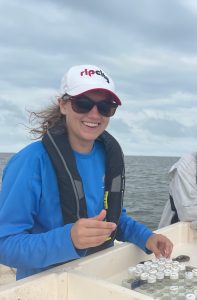Fellowship Fuels Future Forage Fish Research

An ongoing study into the intricate food webs of Florida’s coastal environments recently received a boost from the Florida Fish and Wildlife Conservation Commission (FWC).
The $15,000 fellowship was awarded to Biology graduate student Kira Allen, who is writing a thesis on the impact of freshwater diversion and sea level rise on Apalachicola Bay. Allen specializes in food web models that map the intricate relationships between prey and predator.
“My area of biology really explores the interconnectedness of species,” Allen said. “I find it fascinating to see the wide-reaching impact of changing one variable.”
The FWC fellowship focuses on the role of small, edible fish called forage fish, typically the first vertebrate link in marine food webs. Fish like sardines, anchovies and menhaden eat small plant and animal matter, and are consumed by predatory fish like redfish, snook and sailfish. Allen will blend data analytics and field research to model how their absence alters the coastal ecosystem.
Results from the research will guide FWC’s legislative recommendations and policy making, as well as contribute a deeper scientific understanding of food webs in the bay and how they’re impacted by humans. The FWC also partners with the International Game Fish Association and Pew Charitable Trusts to make the fellowship possible.
The fellowship also develops Allen’s academic and research skills as she learns how to manage funding, document research and publish papers. It’s a challenge sometimes, but the long-term impact the research makes for conservation and other environmental work is worth it, Allen said.
“I’ve grown up around the ocean my whole life,” Allen said. “Ultimately I would love to have my research used to make a difference.”
Last year Allen also secured the inaugural National Oceanic and Atmospheric Administration’s inaugural Margaret A. Davidson Graduate Fellowship for similar work.
